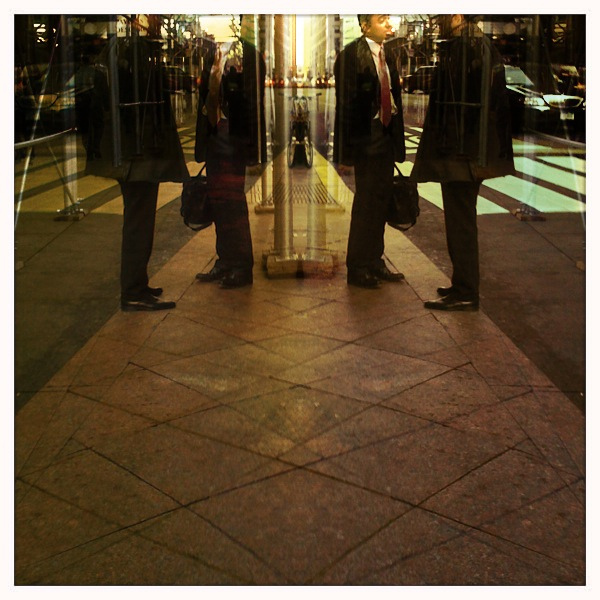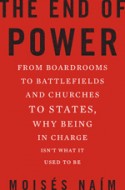
We frequently bemoan our incompetent leaders, but what if their shortcomings aren’t (all) their fault? When he became Venezuela’s minister of trade and industry, Moisés Naím found out firsthand that the structural roadblocks kept his government from taking too much power also kept it from accomplishing anything at all. Naím visits Zócalo to ask whether we’d be better off if we put more power in the hands of our leaders. Below is an excerpt from his book, The End of Power: From Boardrooms to Battlefields and Churches to States, Why Being In Charge Isn’t What It Used to Be.
Power may feel abstract, but for those who are most attuned to it—namely, the powerful themselves—its flow and ebb can have a visceral edge. After all, those in positions of great power are best positioned to spot limits on their effectiveness and to feel frustration over the gap between the power they expect their function to convey and the power they actually have. In my own small way, I experienced such constraints back in February 1989. At the time I had been named, at age thirty-six, the minister of development in the then-democratic government of my home country, Venezuela. Soon after we took office in a landslide election victory, we faced riots in Caracas—triggered by the anxiety over our plans to cut subsidies and raise fuel prices—that paralyzed the city with violence, fear, and chaos. Suddenly, and despite our victory and apparent mandate, the economic reform program that we had championed acquired a very different meaning. Instead of symbolizing hope and prosperity, it was now seen as the source of street violence, increased poverty, and deeper inequality.
But the most profound insight I had at that time was one I would not fully comprehend until years later. It dwelt in the enormous gap between the perception and the reality of my power. In principle, as one of the main economic ministers, I wielded tremendous power. But in practice, I had only a limited ability to deploy resources, to mobilize individuals and organizations, and, more generally, to make things happen. My colleagues and even the president had the same feeling, though we were loath to acknowledge that our government was a hobbled giant. I was tempted to chalk this up to Venezuela itself: surely our sense of powerlessness had to do with our country’s notoriously weak and malfunctioning institutions. Such weakness could not be universal.
Yet later I would appreciate that it was universal indeed, or nearly so, among those with the experience of power. Fernando Henrique Cardoso—the respected former president of Brazil and founding father of that country’s boom—summed it up for me. “I was always surprised at how powerful people thought I was,” he told me when I interviewed him for this book. “Even well-informed, politically sophisticated individuals would come to my office and ask me to do things that showed they assumed I had far more power than I really did. I always thought to myself, if only they knew how limited the power of any president is nowadays. When I meet with other heads of state, we often share very similar recollections in this respect. The gap between our real power and what people expect from us is the source of the most difficult pressure any head of state has to manage.”
I heard something similar from Joschka Fischer, one of Germany’s most popular politicians and a former vice chancellor and foreign minister. “Since I was young, I was fascinated and allured by power,” Fischer told me. “One of my biggest shocks was the discovery that all the imposing government palaces and other trappings of government were in fact empty places. The imperial architecture of governmental palaces masks how limited the power of those who work there really is.”
Over time, I would glean similar observations not just from heads of state and government ministers but also from business leaders and the heads of foundations and major organizations in many fields. And it soon became clear that something more was going on—that it wasn’t simply that the powerful were bemoaning the gap between their perceived and actual power. Power itself was coming under attack in an unprecedented way. Every year since 1990, I have attended the World Economic Forum’s annual meeting in Davos, frequented by the world’s most powerful people in business, government, politics, the media, nongovernmental organizations, science, religion, and culture. In fact, I have been lucky enough to attend and speak at almost all of the most exclusive power-fests in the world, including the Bilderberg Conference, the annual meeting of media and entertainment tycoons in Sun Valley, and the annual meetings of the International Monetary Fund. My conversations each year with fellow participants confirmed my hunch: the powerful are experiencing increasingly greater limits on their power. The reactions to my probing always pointed in the same direction: power is becoming more feeble, transient, and constrained.
But this is not a call to feel sorry for the powerful. Powerful people bemoaning their powerlessness is certainly no reason for hand-wringing in our winner-take-all world. Rather, my aim is to delineate the impact of the decay of power. In the pages ahead I explore this process of decay—its causes, manifestations, and consequences—in terms of the ways it affects not just the top 1 percent but, more importantly, the vast and growing middle class as well as those who seek merely to make it through another day.





Send A Letter To the Editors